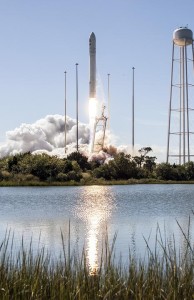
British MP have demanded the government to develop its own national space program, that would run alongside Britain’s existing participation in the European Space Agency (ESA) and help address the problem of skills shortage that is holding back the growth of the British space industry.
A report from the House of Commons Science and Technology Committee was published on Wednesday, and this report discusses the need to set up a national space program that would encourage technological breakthroughs and also help the country get more leadership roles in future ESA missions. MPs warn the UK faces the risk of being left behind by competing countries in absence of a national space program.
The report has appeared at a time when Tim Peake, the first official British astronaut, is preparing to return to Earth after completing his six-month mission in space. Tim will land in Kazakhstan on Saturday along with Russian cosmonaut Yuri Malenchenko and NASA astronaut Tim Kopra.
“For the last six months, attention has rightly been focused on Major Tim Peake and Britain’s role in human spaceflight,” said Nicola Blackwood, who chairs the committee.
“The UK Space Agency estimated that 24m watched Tim Peake’s launch, and while in orbit he has inspired an interest in space in many young people.”
“After he comes back [on Saturday] we need a follow-up plan to engage the audience he has inspired.”
According to the report, Major Peake’s mission “will have done much to encourage young people to think about pursuing a career in [science or engineering]. Relying on the inspirational value of the mission, however, is insufficient to tackle the magnitude of the skills crisis facing the sector. It should be a call to arms, not a cause of complacency.”
The UK’s space sector is currently growing at a rate of 8% per year, but the government wants to raise the UK’s share in the global space market from 6.5% to 10% by 2030. However, a major obstacle in achieving this target is a shortage of trained workers, which, according to the report, is a symptom of a wider “digital skills” crisis.
“The crisis is already apparent in the space and satellite sector,” the report said.
“Without urgent action, data skills shortages could undermine and potentially stall the industry’s progress towards its ambitious 2030 growth target.”
Presently, the UK Space Agency gets a fund of £370 million a year from the government, and about three-quarters of this amount goes in British involvement in ESA. According to the report, a national space program would enable Britain to get more space projects in future.
Te report also suggests that British scientists should focus on developing “small satellites” – less than 500 kg – as it would help British companies to gain commercial credibility for space products.
MPs also want the proposed UK spaceport – that government plans to set up by 2018 – to have capabilities of taking vertical rocket launches. Currently, sites in Glasgow and Newquay are competing in the race to get a license to host commercial space flights in the future.
“The Government’s plans for a UK spaceport will help keep the UK at the forefront of developments in space plane technology,” Ms Blackwood said. “It is a bold ambition but it now needs solid action.”